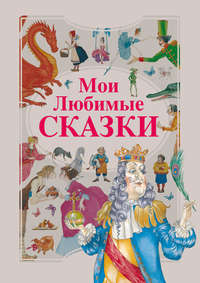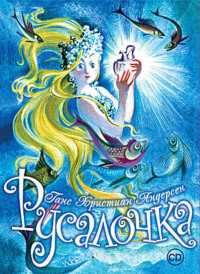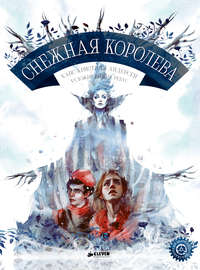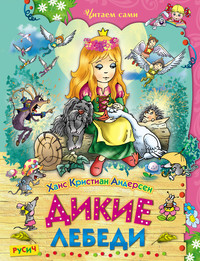 полная версия
полная версияHans Andersen's Fairy Tales. Second Series
The boy rushed out at the sight, sped across the courtyard, and fled from the house. The poor child ran till he was quite out of breath. At last he stopped at the church the doors of which were opened to him the night before, and went in. Here everything was bright, and the boy knelt down by the first tomb on his right hand, the grave of Michelangelo, and sobbed as if his heart would break. People came and went; the service went on, but no one noticed the boy except an elderly citizen, who stood still and looked at him for a moment and then went away like the rest. Hunger and thirst overpowered the child, and he became quite faint and ill. At last he crept into a corner behind the marble monuments and went to sleep. Towards evening he was awakened by a pull at his sleeve. He started up, and the same old citizen stood before him.
"Are you ill? Where do you live? Have you been here all day?" were some of the questions asked by the old man. After hearing his answers, the old man took him to a small house in a back street close by. They entered a glovemaker's shop, where a woman sat sewing busily. A little white poodle, so closely shaved that his pink skin could plainly be seen, frisked about the room and gamboled over the boy.
"Innocent souls are soon intimate," said the woman, as she caressed both the boy and the dog.
These good people gave the child food and drink, and said he should stay with them all night, and that the next day the old man, who was called Giuseppe, would go and speak to his mother. A simple little bed was prepared for him, but to him who had so often slept on the hard stones it was a royal couch, and he slept sweetly and dreamed of the splendid pictures, and of the Metal Pig. Giuseppe went out the next morning, and the poor child was not glad to see him go, for he knew that the old man had gone to his mother, and that perhaps he would have to return. He wept at the thought, and then played with the lively little dog and kissed it, while the old woman looked kindly at him to encourage him.
What news did Giuseppe bring back? At first the boy could not find out, for the old man talked to his wife, and she nodded and stroked the boy's cheek. Then she said, "He is a good lad, he shall stay with us. He may become a clever glovemaker, like you. Look what delicate fingers he has. Madonna intended him for a glovemaker."
So the boy stayed with them, and the woman herself taught him to sew. He ate well, and slept well, and became very merry. But at last he began to tease Bellissima, as the little dog was called. This made the woman angry, and she scolded him and threatened him, which made him unhappy, and he went and sat in his own room, full of sad thoughts. This chamber looked out upon the street, in which hung skins to dry, and there were thick iron bars across his window. That night he lay awake, thinking of the Metal Pig. Indeed, it was always in his thoughts. Suddenly he fancied he heard feet outside going pitapat. He sprang out of bed and went to the window. Could it be the Metal Pig? But there was nothing to be seen. Whatever he had heard had passed already.
"Go help the gentleman to carry his box of colors," said the woman the next morning when their neighbor, the artist, passed by, carrying a paint box and a large roll of canvas. The boy instantly took the box and followed the painter. They walked on till they reached the picture gallery, and mounted the same staircase up which he had ridden that night on the Metal Pig. He remembered all the pictures and statues, especially the marble Venus, and again he looked at the Madonna with the Saviour and St. John. They stopped before the picture by Il Bronzino, in which Christ is represented as standing in the lower world, with the children smiling before him in the sweet expectation of entering heaven. The poor boy smiled, too, for here was his heaven.
"You may go home now," said the painter, while the boy stood watching him till he had set up his easel.
"May I see you paint?" asked the boy. "May I see you put the picture on this white canvas?"
"I am not going to paint," replied the artist, bringing out a piece of chalk. His hand moved quickly, and his eye measured the great picture, and though nothing appeared but a faint line, the figure of the Saviour was as clearly visible as in the colored picture.
"Why don't you go?" said the painter. Then the boy wandered home silently, and seated himself on the table, and learned to sew gloves. But all day long his thoughts were in the picture gallery, and so he pricked his fingers and was awkward. But he did not tease Bellissima. When evening came, and the house door stood open, he slipped out. It was a bright, beautiful, starlight evening, but rather cold. Away he went through the already deserted streets, and soon came to the Metal Pig. He stooped down and kissed its shining nose, and then seated himself on its back.
"You happy creature," he said; "how I have longed for you! We must take a ride to-night."
But the Metal Pig lay motionless, while the fresh stream gushed forth from its mouth. The little boy still sat astride its back, when he felt something pulling at his clothes. He looked down, and there was Bellissima, little smooth-shaven Bellissima, barking as if she would have said, "Here I am, too. Why are you sitting there?"
A fiery dragon could not have frightened the little boy so much as did the little dog in this place. Bellissima in the street and not dressed! as the old lady called it. What would be the end of this? The dog never went out in winter, unless she was attired in a little lambskin coat, which had been made for her. It was fastened round the little dog's neck and body with red ribbons, and decorated with rosettes and little bells. The dog looked almost like a little kid when she was allowed to go out in winter and trot after her mistress. Now, here she was in the cold, and not dressed. Oh, how would it end? All his fancies were quickly put to flight; yet he kissed the Metal Pig once more, and then took Bellissima in his arms. The poor little thing trembled so with cold that the boy ran homeward as fast as he could.
"What are you running away with there?" asked two of the police whom he met, and at whom the dog barked. "Where have you stolen that pretty dog?" they asked, and took it away from him.
"Oh, I have not stolen it. Do give it back to me," cried the boy, despairingly.
"If you have not stolen it, you may say at home that they can send to the watch-house for the dog." Then they told him where the watch-house was, and went away with Bellissima.
Here was trouble indeed. The boy did not know whether he had better jump into the Arno or go home and confess everything. They would certainly kill him, he thought.
"Well, I would gladly be killed," he reasoned; "for then I should die and go to heaven." And so he went home, almost hoping for death.
The door was locked, and he could not reach the knocker. No one was in the street, so he took up a stone and with it made a tremendous noise at the door.
"Who is there?" asked somebody from within.
"It is I," said he. "Bellissima is gone. Open the door, and then kill me."
Then, indeed, there was a great panic, for madam was so very fond of Bellissima. She immediately looked at the wall where the dog's dress usually hung; and there was the little lambskin.
"Bellissima in the watch-house!" she cried. "You bad boy! How did you entice her out? Poor little delicate thing, with those rough policemen! And she'll be frozen with cold."
Giuseppe went off at once, while his wife lamented and the boy wept. Several of the neighbors came in, and among them the painter. He took the boy between his knees and questioned him. Soon he heard the whole story, told in broken sentences, and also about the Metal Pig and the wonderful ride to the picture gallery, which was certainly rather incomprehensible. The painter, however, consoled the little fellow, and tried to soften the woman's anger, but she would not be pacified till her husband returned from the police with Bellissima. Then there was great rejoicing, and the painter caressed the boy and gave him a number of pictures.
Oh, what beautiful pictures those were – figures with funny heads! And, best of all, the Metal Pig was there, too. Nothing could be more delightful! By means of a few strokes it was made to appear on the paper; and even the house that stood behind it had been sketched. Oh, if he could only draw and paint! He who could do this could conjure all the world before him. The first leisure moment during the next day the boy got a pencil, and on the back of one of the other drawings he attempted to copy the drawing of the Metal Pig, and he succeeded. Certainly it was rather crooked, rather up and down, one leg thick, and another thin. Still it was like the copy, and he was overjoyed at what he had done. The pencil would not go quite as it ought, he had found, but the next day he tried again. A second pig was drawn by the side of the first, and this looked a hundred times better. The third attempt was so good that everybody could see what it was meant to represent.
And now the glovemaking went on but slowly. The orders given by the shops in the town were not finished quickly; for the Metal Pig had taught the boy that all objects may be drawn upon paper, and Florence is a picture book in itself for any one who chooses to turn over its pages. On the Piazza della Trinità stands a slender pillar, and upon it is the goddess of justice blindfolded, with her scales in her hand. She was soon represented on paper, and it was the glovemaker's boy who placed her there. His collection of pictures increased, but as yet they were only copies of lifeless objects, when one day Bellissima came gamboling before him. "Stand still," cried he, "and I will draw you beautifully, to put in my collection."
Bellissima would not stand still, so she must be bound fast in one position. He tied her head and tail, but she barked and jumped and so pulled and tightened the string that she was nearly strangled. And just then her mistress walked in.
"You wicked boy! The poor little creature!" was all she could utter.
She pushed the boy from her, thrust him away with her foot, called him a most ungrateful, good-for-nothing, wicked boy, and forbade him to enter her house again. Then she wept, and kissed her little half-strangled Bellissima. At this moment the painter entered the room – and here is the turning point of the story.
In the year 1834 there was an exhibition in the Academy of Arts at Florence. Two pictures, placed side by side, attracted many people. The smaller of the two represented a little boy sitting at a table drawing. Before him was a little white poodle, curiously shaven, but as the animal would not stand still, its head and tail had been fastened with a string, to keep it in one position. The truthfulness and life in this picture interested every one. The painter was said to be a young Florentine, who had been found in the streets when a child by an old glovemaker, who had brought him up. The boy had taught himself to draw. It was also said that a young artist, now famous, had discovered this talent in the child just as he was about to be sent away for having tied up madam's favorite little dog to use as a model.
The glovemaker's boy had become a really great painter, as the picture proved; but the larger picture by its side was a still greater proof of his talent. It represented a handsome boy asleep, clothed in rags and leaning against the Metal Pig, in the street of the Porta Rosa. All the spectators knew the spot well. The child's arms were round the neck of the Pig, and he was in a deep sleep. The lamp before the picture of the Madonna threw a strong light on the pale, delicate face of the child. It was a beautiful picture. A large gilt frame surrounded it, and on one corner of the frame a laurel wreath had been hung. But a black band, twined unseen among the green leaves, and a streamer of crape hung down from it; for within the last few days the young artist had – died.
THE FLYING TRUNK
THERE was once a merchant who was so rich that he could have paved a whole street with gold, and would even then have had enough left for a small alley. He did not do so; he knew the value of money better than to use it in this way. So clever was he that every shilling he put out brought him a crown, and so it continued as long as he lived.
His son inherited his wealth, and lived a merry life with it. He went to a masquerade every night, made kites out of five-pound notes, and threw pieces of gold into the sea instead of stones, making ducks and drakes of them.
In this manner he soon lost all his money. At last he had nothing left but a pair of slippers, an old dressing gown, and four shillings. And now all his companions deserted him. They would not walk with him in the streets, but one of them, who was very good-natured, sent him an old trunk with this message, "Pack up!"
"Yes," he said, "it is all very well to say 'pack up.'" But he had nothing left to pack, therefore he seated himself in the trunk.
It was a very wonderful trunk, for no sooner did any one press on the lock than the trunk could fly. He shut the lid and pressed the lock, when away flew the trunk up the chimney, with him in it, right up into the clouds. Whenever the bottom of the trunk cracked he was in a great fright, for if the trunk had fallen to pieces, he would have turned a tremendous somersault over the trees. However, he arrived safely in Turkey. He hid the trunk in a wood under some dry leaves and then went into the town. This he could do very well, for among the Turks people always go about in dressing gowns and slippers, just as he was.
He happened to meet a nurse with a little child. "I say, you Turkish nurse," cried he, "what castle is that near the town, with the windows placed so high?"
"The Sultan's daughter lives there," she replied. "It has been prophesied that she will be very unhappy about a lover, and therefore no one is allowed to visit her unless the king and queen are present."
"Thank you," said the merchant's son. So he went back to the wood, seated himself in his trunk, flew up to the roof of the castle, and crept through the window into the room where the princess lay asleep on the sofa. She awoke and was very much frightened, but he told her he was a Turkish angel who had come down through the air to see her. This pleased her very much. He sat down by her side and talked to her, telling her that her eyes were like beautiful dark lakes, in which the thoughts swam about like little mermaids; and that her forehead was a snowy mountain which contained splendid halls full of pictures. He related to her the story about the stork, who brings the beautiful children from the rivers. These stories delighted the princess, and when he asked her if she would marry him, she consented immediately.
"But you must come on Saturday," she said, "for then my parents will take tea with me. They will be very proud when they find that I am going to marry a Turkish angel. But you must think of some very pretty stories to tell them, for they like to hear stories better than anything. My mother prefers one that is deep and moral, but my father likes something funny, to make him laugh."
"Very well," he replied, "I shall bring you no other marriage portion than a story"; and so they parted. But the princess gave him a sword studded with gold coins, and these he could make useful.
He flew away to the town and bought a new dressing gown, and afterwards returned to the wood, where he composed a story so as to be ready by Saturday; and that was no easy matter. It was ready, however, when he went to see the princess on Saturday. The king and queen and the whole court were at tea with the princess, and he was received with great politeness.
"Will you tell us a story?" said the queen; "one that is instructive and full of learning."
"Yes, but with something in it to laugh at," said the king.
"Certainly," he replied, and commenced at once, asking them to listen attentively.
"There was once a bundle of matches that were exceedingly proud of their high descent. Their genealogical tree – that is, a great pine tree from which they had been cut – was at one time a large old tree in the wood. The matches now lay between a tinder box and an old iron saucepan and were talking about their youthful days. 'Ah! then we grew on the green boughs,' said they, 'and every morning and evening we were fed with diamond drops of dew. Whenever the sun shone we felt his warm rays, and the little birds would relate stories to us in their songs. We knew that we were rich, for the other trees only wore their green dresses in summer, while our family were able to array themselves in green, summer and winter. But the woodcutter came like a great disaster, and our family fell under the ax. The head of the house obtained a situation as mainmast in a very fine ship and can sail round the world whenever he will. Other branches of the family were taken to different places, and our own office now is to kindle a light for common people. This is how such highborn people as we came to be in a kitchen.'
"'Mine has been a very different fate,' said the iron pot, which stood by the matches. 'From my first entrance into the world I have been used to cooking and scouring. I am the first in this house when anything solid or useful is required. My only pleasure is to be made clean and shining after dinner and to sit in my place and have a little sensible conversation with my neighbors. All of us excepting the water bucket, which is sometimes taken into the courtyard, live here together within these four walls. We get our news from the market basket, but it sometimes tells us very unpleasant things about the people and the government. Yes, and one day an old pot was so alarmed that it fell down and was broken in pieces.'
"'You are talking too much,' said the tinder box; and the steel struck against the flint till some sparks flew out, crying, 'We want a merry evening, don't we?'
"'Yes, of course,' said the matches. 'Let us talk about those who are the highest born.'
"'No, I don't like to be always talking of what we are,' remarked the saucepan. 'Let us think of some other amusement; I will begin. We will tell something that has happened to ourselves; that will be very easy, and interesting as well. On the Baltic Sea, near the Danish shore – '
"'What a pretty commencement!' said the plates. 'We shall all like that story, I am sure.'
"'Yes. Well, in my youth I lived in a quiet family where the furniture was polished, the floors scoured, and clean curtains put up, every fortnight.'
"'What an interesting way you have of relating a story,' said the carpet broom. 'It is easy to perceive that you have been a great deal in society, something so pure runs through what you say.'
"'That is quite true,' said the water bucket; and it made a spring with joy and splashed some water on the floor.
"Then the saucepan went on with its story, and the end was as good as the beginning.
"The plates rattled with pleasure, and the carpet broom brought some green parsley out of the dust hole and crowned the saucepan. It knew this would vex the others, but it thought, 'If I crown him to-day, he will crown me to-morrow.'
"'Now let us have a dance,' said the fire tongs. Then how they danced and stuck one leg in the air! The chair cushion in the corner burst with laughter at the sight.
"'Shall I be crowned now?' asked the fire tongs. So the broom found another wreath for the tongs.
"'They are only common people after all,' thought the matches. The tea urn was now asked to sing, but she said she had a cold and could not sing unless she felt boiling heat within. They all thought this was affectation; they also considered it affectation that she did not wish to sing except in the parlor, when on the table with the grand people.
"In the window sat an old quill pen, with which the maid generally wrote. There was nothing remarkable about the pen, except that it had been dipped too deeply in the ink; but it was proud of that.
"'If the tea urn won't sing,' said the pen, 'she needn't. There's a nightingale in a cage outside, that can sing. She has not been taught much, certainly, but we need not say anything this evening about that.'
"'I think it highly improper,' said the teakettle, who was kitchen singer and half brother to the tea urn, 'that a rich foreign bird should be listened to here. Is it patriotic? Let the market basket decide what is right.'
"'I certainly am vexed,' said the basket, 'inwardly vexed, more than any one can imagine. Are we spending the evening properly? Would it not be more sensible to put the house in order? If each were in his own place, I would lead a game. This would be quite another thing.'
"'Let us act a play,' said they all. At the same moment the door opened and the maid came in. Then not one stirred; they remained quite still, although there was not a single pot among them that had not a high opinion of himself and of what he could do if he chose.
"'Yes, if we had chosen,' each of them thought, 'we might have spent a very pleasant evening.'
"The maid took the matches and lighted them, and dear me, how they spluttered and blazed up!
"'Now then,' they thought, 'every one will see that we are the first. How we shine! What a light we give!' But even while they spoke their lights went out."
"What a capital story!" said the queen. "I feel as if I were really in the kitchen and could see the matches. Yes, you shall marry our daughter."
"Certainly," said the king, "thou shalt have our daughter." The king said "thou" to him because he was going to be one of the family. The wedding day was fixed, and on the evening before, the whole city was illuminated. Cakes and sweetmeats were thrown among the people. The street boys stood on tiptoe and shouted "Hurrah," and whistled between their fingers. Altogether it was a very splendid affair.
"I will give them another treat," said the merchant's son. So he went and bought rockets and crackers and every kind of fireworks that could be thought of, packed them in his trunk, and flew up with it into the air. What a whizzing and popping they made as they went off! The Turks, when they saw the sight, jumped so high that their slippers flew about their ears. It was easy to believe after this that the princess was really going to marry a Turkish angel.
As soon as the merchant's son had come down to the wood after the fireworks, he thought, "I will go back into the town now and hear what they think of the entertainment." It was very natural that he should wish to know. And what strange things people did say, to be sure! Every one whom he questioned had a different tale to tell, though they all thought it very beautiful.
"I saw the Turkish angel myself," said one. "He had eyes like glittering stars and a head like foaming water."
"He flew in a mantle of fire," said another, "and lovely little cherubs peeped out from the folds."
He heard many more fine things about himself and that the next day he was to be married. After this he went back to the forest to rest himself in his trunk. It had disappeared! A spark from the fireworks which remained had set it on fire. It was burned to ashes. So the merchant's son could not fly any more, nor go to meet his bride. She stood all day on the roof, waiting for him, and most likely she is waiting there still, while he wanders through the world telling fairy tales – but none of them so amusing as the one he related about the matches.
THE BUTTERFLY
THERE was once a butterfly who wished for a bride; and, as may be supposed, he wanted to choose a very pretty one from among the flowers. He glanced with a very critical eye at all the flower beds and found that the flowers were seated quietly and demurely on their stalks, just as maidens should sit. But there was a great number of them, and it appeared as if making his choice would become very wearisome. The butterfly did not like to take too much trouble, so he flew off on a visit to the daisies.
The French call this flower Marguerite and say that it can prophesy. Lovers pluck off the leaves, and as they pluck each leaf they ask a question about their sweethearts, thus: "Does he or she love me? Dearly? Distractedly? Very much? A little? Not at all?" and so on. Each one speaks these words in his own language.









